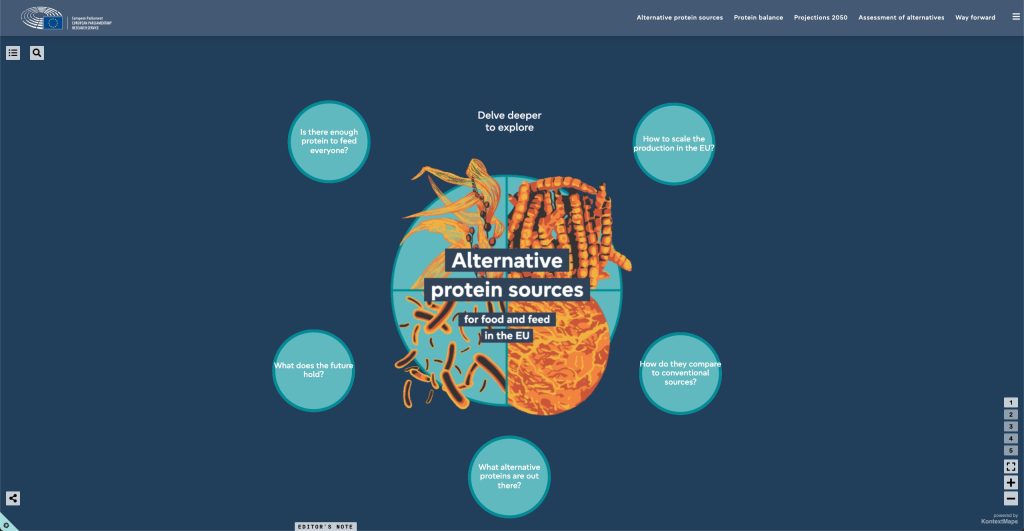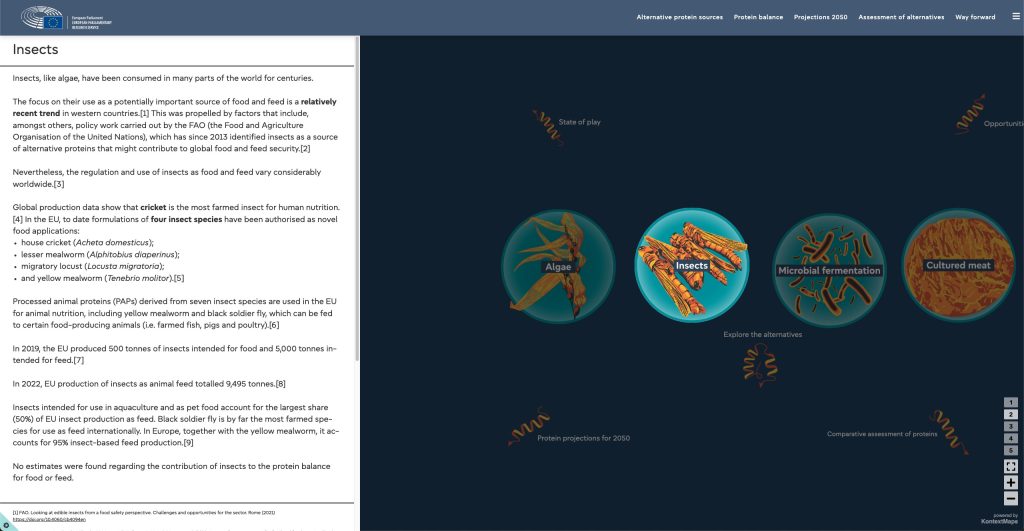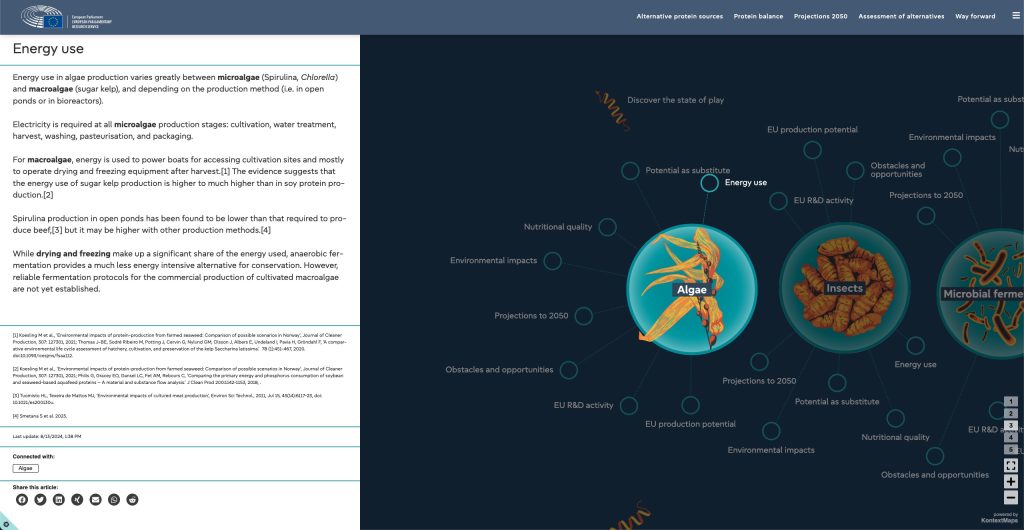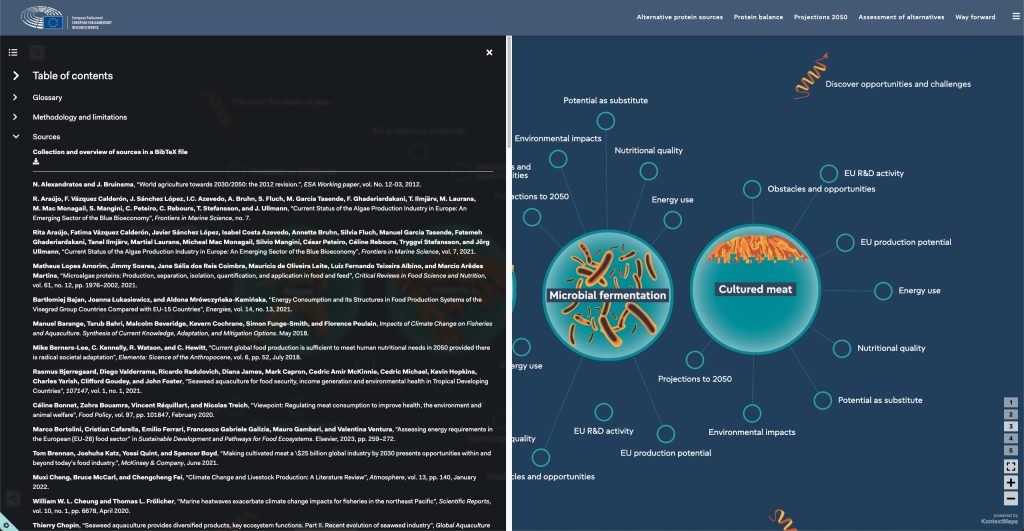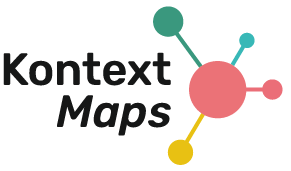###Pressemeldung###
EU Parliament publishes comprehensive KontextMap on alternative sources of protein.
The EU Parliament is presenting an innovative digital knowledge map on the topic of alternative proteins, created using KontextMaps technology from Munich and in collaboration with Kontextlab. The EU Parliament’s Scientific Service (STOA Panel, ESMH) published the map, which is based on three comprehensive studies and presents scientific background, perspectives and facts on alternative proteins. The map provides in-depth insights into an increasingly relevant topic and helps readers to form an informed opinion.
Link to the map: https://map.sciencemediahub.eu/alternative-proteins
Background
The demand for sustainable and healthy alternatives to animal proteins is growing rapidly. Anyone who wants to understand where our food will come from in the future needs different perspectives, needs to know the opportunities and challenges, and needs to understand the scientific background. The EU Parliament’s digital knowledge map addresses the interest comprehensively and on a scientific basis.
With the innovative KontextMaps technology and the structural and design support of Kontextlab, an interactive publication was created that allows users to navigate through a variety of information and infographics and gain a comprehensive picture of the current state of research and debate on alternative proteins. The map provides an overview as well as detailed insights from different perspectives, thus allowing a targeted examination. Technical terms are explained, and a table of contents and search function help with orientation.
Contents of the knowledge map:
The knowledge map covers four main areas of alternative proteins: algae, insects, cultured meat and microbial fermentation. Each of these areas is divided into various topics in detail and highlights the following aspects:
- Potential as a meat substitute – What possibilities do the respective alternatives offer as sustainable meat substitutes?
- Projection 2050 – How will the relevance and use of hydrogen develop by 2050?
- Nutritional quality – What health benefits or drawbacks do the protein sources offer?
- Environmental impact – How does production affect environmental factors such as CO₂ emissions and water consumption?
- Production potential in the EU – How easy is it to establish and scale up production within the EU?
- Challenges and obstacles – What regulatory and technical hurdles still need to be overcome?
- Energy consumption – How much energy is required for production?
- The EU’s research and development potential – What opportunities and potential exist for the EU in research and development?
In addition to these core topics, the knowledge map contains several information areas that explain the topic of alternative proteins in more detail or offer in-depth perspectives on the 2050 outlook.
Quote
from Svetla Tanova-Encke, coordinator of the European Science Media Hub of the EU Parliament STOA Panel:
“The knowledge map on alternative proteins has been an excellent way to visualise the European Parliament’s Panel for the Future of Science and Technology (STOA) study ‘Alternative protein sources for food and feed’ https://www.europarl.europa.eu/stoa/en/document/EPRS_STU(2024)757806 . Next to being able to present the main alternative protein sources in a beautiful visual way, the infographic gives the opportunity to zoom into more context, and to explore details assessing the meat alternatives in terms of sustainability, energy needs, climate impact and nutrition potential. The map is an inspiring path to present complex issues in an accessible way and to structure information and content.”
Advantages of using KontextMaps and Kontextlab for the project:
The KontextMaps technology, as well as the structing and design expertise of Kontextlab, enabled the European Parliamentary Research Service to present a large amount of information in a structured way and to facilitate access to knowledge. The map offers a clear structure and intuitive navigation, allowing different points of view to be viewed directly next to each other. The interactive structure allows users to dive into specific topics and discover connections and arguments independently.
Bottom line
The digital knowledge map is now available on the website of the European Parliament’s research service and provides an unprecedented resource for anyone interested in the topic of alternative proteins. Kontextlab is proud to be part of this project and to contribute to education and knowledge dissemination with its technology as well as design and structuring expertise. Explore the map and discover what alternative proteins can mean for the future of nutrition and sustainability.
Kontextlab and KontextMaps:
Kontextlab is a leading provider of digital knowledge maps and specializes in the visualization, structuring and design of complex information. With our KontextMaps technology and design expertise, we help organizations make knowledge more accessible and create interactive publications that promote in-depth exploration and knowledge sharing.
Eintauchen. Entdecken. Verstehen.
Contakt:
info@kontextlab.com
Buttermelcherstraße 16
80469 Munich
Germany
